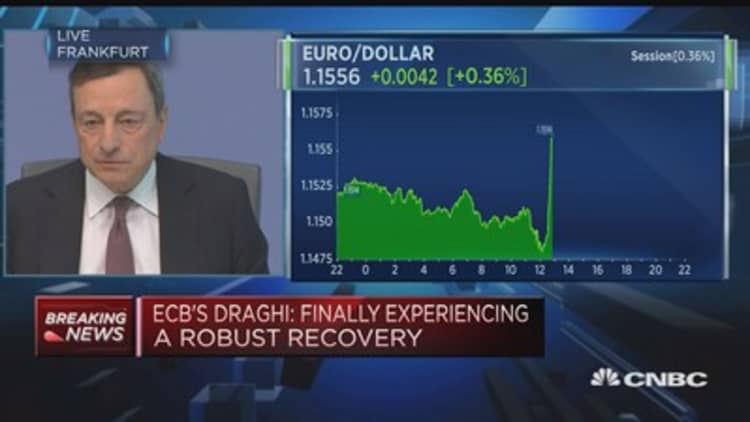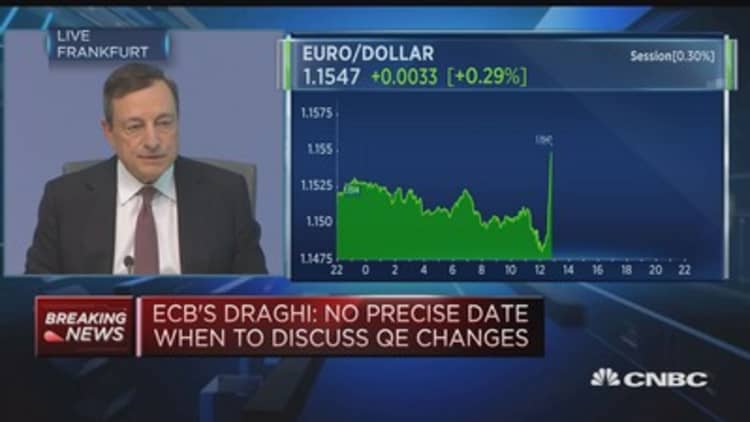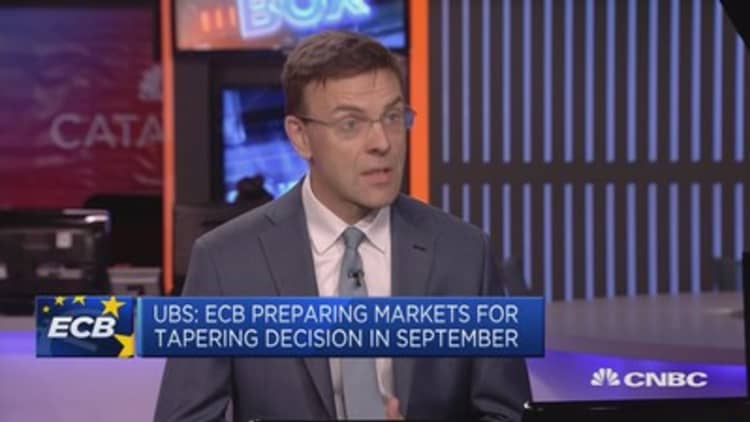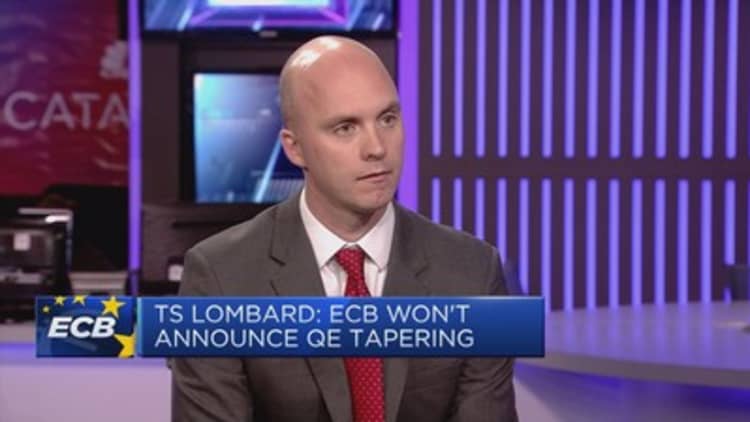
European Central Bank President Mario Draghi's difficult task of calming markets was laid bare on Thursday afternoon, as an initial dovish message by the ECB was quickly drowned out by talk of inflation and an end to asset purchases.
The bank held interest rates and asset purchases steady on Thursday, amid speculation that it will start to scale back its ultra-loose monetary policy in the fall. It also struck a somewhat dovish tone and insisted that it would be poised to step in should the outlook take a downward turn.
"If the outlook becomes less favorable, or if financial conditions become inconsistent with further progress towards a sustained adjustment in the path of inflation, the Governing Council stands ready to increase the program in terms of size and/or duration," the ECB said in its policy announcement alongside its rate decision.
The euro initially dropped to $1.1489 against the dollar on the news, losing some of the gains recorded in recent weeks. The pan-European Euro Stoxx 600 index extended gains a little on the announcement and yields on the 10-year German bund also pushed lower.

However, at a subsequent news conference with Draghi those market moves were quickly reversed. The Italian economist spoke of underlying inflation rising in the coming months, albeit gradually. But he also commented on discussions involving the bank's quantitative easing program, mentioning that ECB members would debate bond purchases at its September meeting.
Many market participants expect that improved economic growth in the euro zone will cause a shift away from years of easy money, where interest rates have been held at 0.00 percent for 17 consecutive months.
The euro quickly moved higher after Draghi's comments that these discussions will take place. The common currency rose above 1.55 against the dollar after falling to a session low of nearly 1.148
Markets were shaken last month by hawkish comments from Draghi which suggested that the bank would steam ahead with interest rate hikes and the reduction of its bond-buying program — actions used to inject cash into the economy. During an ECB forum in Sintra, Portugal, in June, Draghi said that "all the signs now point to a strengthening and broadening recovery in the euro area" and added the bank would need to be "persistent" and "prudent" in adjusting its parameters going forward.
The comments initiated a mini tantrum in financial markets as they caught a glimpse of the winding down of the unprecedented central bank stimulus which has characterized the years since the global financial crisis.
They came just weeks after the ECB's monthly policy meeting in which it dropped its reference to future rate cuts but insisted that interest rates could be expected to "remain at present levels for an extended period of time."
Since then, the ECB has resisted overtly backtracking on Draghi's comments, in a bid to avoid confusing markets further, but it has been careful to temper its comments so as to prevent an unwanted tightening of monetary conditions. Thursday's dovish message was another example of that.

'Taper' next year?
UBS' chief economist, Reinhard Cluse, told CNBC on Thursday, ahead of the announcement, that he expected the bank to announce the gradual winding down of its quantitative easing (QE) program on Sept. 7, when policymakers return from summer recess.
He said this is likely to kick off in January next year and run until the end of the summer. This program will be followed later by interest rate hikes.
"We think it's a program that will take six to nine months, so by the summer or late summer of 2018 that tapering program will be complete. We think interest rate hikes will come as of 2019 but proceed very gradually and in a data-dependent fashion. In the meantime we think the ECB will keep liquidity conditions very easy," Cluse said.
However, he insisted that the shifting of money market rates could be a "multiyear process."

Oliver Brennan, senior macro strategist at TS Lombard, agreed that the tapering could be expected at an average pace of $10 billion per meeting, which would enable its completion in the third quarter of next year.
The ECB's shifting stance shadows that laid out before it by the U.S. Federal Reserve, which has been gradually raising interest rates on the back of a strengthening economy.
Fed Chair Janet Yellen announced at the central bank's monthly meeting last week that U.S. interest rates were reaching "neutral" levels and any further hikes would be gradual.


